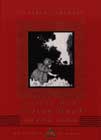| Introduction | Annotated Tales | eBooks | Bookstore | Illustration Gallery | Discussion Board | Blog |
 |
|
|
The Ludicrous Wishes Return to The Fairy Tales of Charles Perrault THERE was once a poor woodcutter who, tired of his hard life, longed for rest in the world to come. In his unhappiness, he declared that in all his days heaven had not granted even one of his wishes. One day in the woods, as the woodcutter was complaining of his unhappy lot, Jupiter appeared before him, his thunderbolts in his hands. It would be difficult to picture the terror of the poor man. "I desire nothing," he said, casting himself on the ground. I will give up my wishes if you, in turn, will give up your thunder. That's a fair exchange!" "Have no fear," said Jupiter. "I have heard your complaints and I have come to show you how unfairly you judge me. Now listen! I am king of all the world and I promise to grant your first three wishes, no matter what they may be. See that they make you happy and content; and since your happiness depends on them, think carefully before you make them." With these words, Jupiter returned to his heavens and the happy woodcutter, taking up his bundle of sticks, hurried to his home. Never had his burden seemed so light. "This is an important matter," he said to himself. ''I certainly must have my wife's advice." "Hey, Fanchon," he shouted, as he entered his cottage. "Let us up a good fire. We are rich for the rest of our lives. All we have to do is to make three wishes!" With this, he told his wife what had happened, whereupon she in her imagination began to form a thousand plans. But realizing the importance of acting prudently, she said to her husband, "Blaise, my dear, let us not spoil anything by our impatience. We must think things over very carefully. Let us put off our first wish until tomorrow. Let us sleep on it." "I think you are right," said he. "But first go draw some of that special wine." On her return, the woodcutter drank deeply and leaned back in his chair before the fire. "To match such a fine blaze," he said, "I wish we had a measure of sausage. It would go very well indeed!" Scarcely had he spoken these words when his wife, to her great astonishment, saw a long link of sausage moving over to them like a snake from the chimney corner. She cried out in alarm, but realizing at once that this was the result of the wish which her foolish husband had made, she began to abuse and scold him angrily. "When you might," she said, "have a kingdom, with gold, pearls, rubies, diamonds, fine clothes; and all you wish for is a sausage!" "Alas," her husband replied. "I was wrong, I made a very bad choice. I admit my mistake. Next time I will do better." "Yes! Yes!" said his wife. "I'll repeat it till Doomsday. To make such a choice as you did, you must be a donkey." At this the husband became very angry and almost wished his wife was dead. "Mankind," he said, "is born to suffer. A curse on this and all sausages. I wish that it was hanging from the end of your nose!" The wish was heard at once in heaven, and the sausage fastened itself on her nose. Fanchon had once been pretty, and, -- to tell the truth -- this ornament did not have a very pleasing effect. Since it hung down over her face, however, it interfered with her talking, and this was such an advantage to her husband that he did not think he had wished too badly. "With my remaining wish I could very well still make myself a king," he said to himself. "But we must think of the queen, too, and her unhappiness if she were to sit on the throne with her new yard-long nose. She must decide which she wants, to be a queen with that nose or a woodcutter's wife and an ordinary person." Whereupon his wife agreed that they had no choice. She would never have the riches and diamonds and fine clothes she had dreamed of, but she would be herself again if the last wish would free her from the frightful sausage on her nose. And so the woodcutter did not change his lot. He did not become a king. His purse was not filled with gold. He was only too glad to use his remaining wish in restoring his poor wife to her former state. Perrault, Charles. Old-Time Stories told by Master Charles Perrault. A. E. Johnson, translator. New York: Dodd Mead and Company, 1921. Return to The Fairy Tales of Charles Perrault |
|
| ©Heidi
Anne Heiner, SurLaLune Fairy Tales E-mail: heidi@surlalunefairytales.com Page created 1/15/05; Last updated 10/24/07 www.surlalunefairytales.com |












